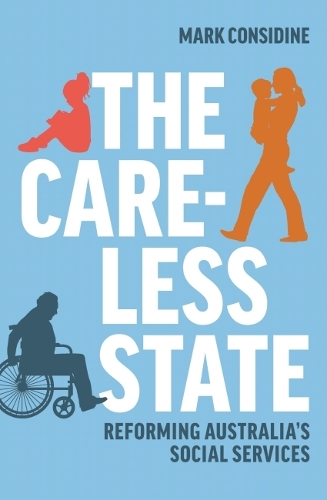
The Careless State: Reforming Australia's Social Services
(Paperback)
Publishing Details
The Careless State: Reforming Australia's Social Services
By (Author) Mark Considine
Melbourne University Press
Melbourne University Press
5th October 2022
Australia
Classifications
General
Non Fiction
Central / national / federal government
Welfare economics
Social services and welfare, criminology
Social classes
361.994
Physical Properties
Paperback
256
Width 154mm, Height 234mm, Spine 17mm
336g
Description
A powerful statement of how to fix Australia's failing social services The lives of all Australians are profoundly affected by the quality of social services available, but a long list of royal commissions and public inquiries have revealed them to be failing. In The Careless State Mark Considine shows that the preferred model of reform has failed to adapt and improve. In the 1980s Australian governments faced rapidly increasing demand for services in areas like employment assistance, aged care, childcare and vocational education and training; to respond to this challenge, governments led by Bob Hawke and Paul Keating pioneered the introduction of service markets, where private companies compete with public institutions and charities in newly constructed social services. This 'choice revolution' was embraced and extended by the Howard government. Market choice continues to drive reform across a wide spectrum of programs and social services. Considine's detailed investigation demonstrates conclusively that important aspects of the experiment with social service markets have failed. Weak quality control, systematic rorting and entrenched disadvantage have become the norm. Private business interests and shareholders' interest have often displaced established charities and commitment to quality care for all. The service systems are careless, leaving clients to make choices without real information or protection. Considine points to alternative ways that reforms could be configured to get the best from both private and public agencies, and find a new approach to save these failing services.
Author Bio
Mark Considine is Redmond Barry Distinguished Professor of Political Science at the University of Melbourne. He is best known for prize-winning research on public sector reform, new methods of governance and the street-level delivery of public programs. He and his team have pioneered work on the long-run institutional impacts of different service delivery regimes. Mark has also had a significant career in leadership roles within higher education and as a contributor to policy innovation inside government and in civil society organisations.
